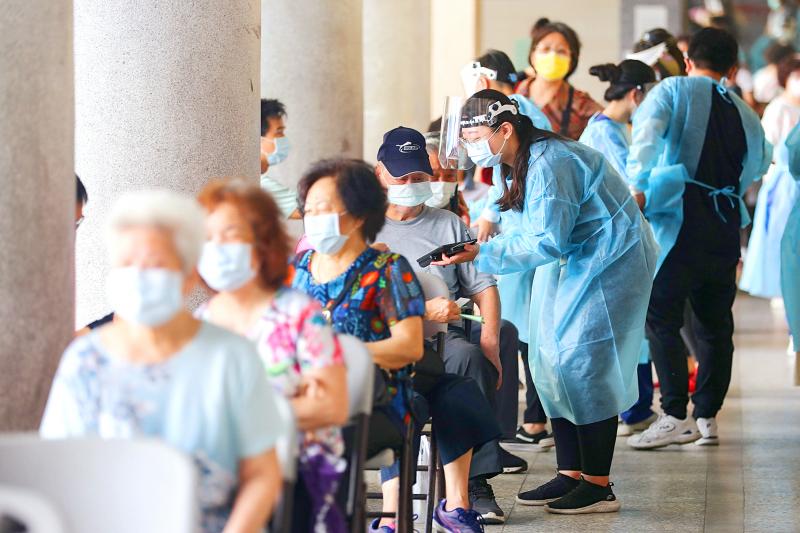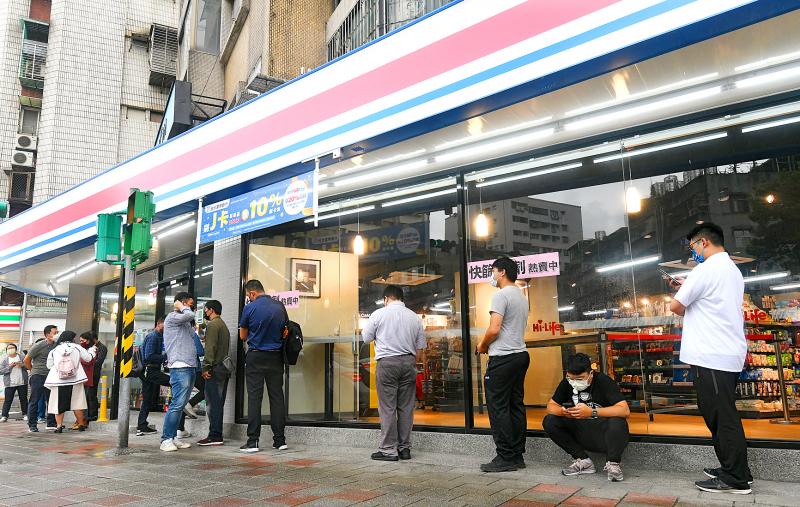Thirty-four more people have died after receiving the AstraZeneca COVID-19 vaccine, the Central Epidemic Command Center (CECC) said yesterday, adding that none of the autopsies performed so far have connected post-vaccination deaths to the shots.
The deaths recorded on Wednesday were 16 women and 18 men who died one to eight days after being vaccinated, Centers for Disease Control Deputy Director-General Chuang Jen-hsiang (莊人祥), who is the CECC’s spokesman, told a daily news briefing in Taipei.
Their ages ranged from 52 to 96, with 29 of them over the age of 75, he said.

Photo: CNA
The youngest among them, a man aged 52, had been in a nursing home and had a history of hypertension, colon cancer and epilepsy, Chuang said, adding that he was also on long-term dialysis.
He received a vaccine at the nursing home in the middle of this month and was admitted to a hospital two days later after experiencing a fever and shortness of breath, Chuang said.
The man spent three days in an intensive care unit, but his condition worsened as a result of pneumonia combined with respiratory failure and septic shock, Chuang said.

Photo: Liao Chen-huei, Taipei Times
He died five days after receiving the vaccination, Chuang said.
It appeared that the pneumonia led to his death, Chuang said, adding that the CECC would further look into the matter if an autopsy is performed.
Ten more autopsies on people who died after receiving COVID-19 vaccinations have been performed, bringing the total completed to 26, Chuang said.
Twenty-three of them showed the cause of death to be related to chronic health conditions, one was the result of asphyxia after choking on food and two were due to cervical fractures, he said.
Based on the autopsy results, none of the deaths appeared to have been caused by the vaccines, he added.
As of yesterday, 178 people — 87 women and 91 men — have died after receiving a dose of the AstraZeneca vaccine, CECC data showed.
They were aged 41 to 101, and 141 of them were older than 75, the center said.
They died up to eight days after inoculation, it added.
As of Wednesday, 1,746,130 COVID-19 vaccine doses had been administered in the nation, including 1,714,268 first doses and 31,862 second doses, the CECC said.
Of them, 1,650,166 were AstraZeneca shots, while Moderna’s vaccine accounted for 95,964.
The nation’s COVID-19 vaccine coverage was 7.43 percent, said Minister of Health and Welfare Chen Shih-chung (陳時中), who heads the center.
The center last week advised people who have chronic diseases or feel unwell to hold off on receiving their shots until their conditions are stable.
It also advised older people to receive their vaccinations at facilities near their homes to avoid long journeys, adding that they should also avoid seeking inoculation in hot weather.
Additional reporting by Lin Hui-chin

AGING: As of last month, people aged 65 or older accounted for 20.06 percent of the total population and the number of couples who got married fell by 18,685 from 2024 Taiwan has surpassed South Korea as the country least willing to have children, with an annual crude birthrate of 4.62 per 1,000 people, Ministry of the Interior data showed yesterday. The nation was previously ranked the second-lowest country in terms of total fertility rate, or the average number of children a woman has in her lifetime. However, South Korea’s fertility rate began to recover from 2023, with total fertility rate rising from 0.72 and estimated to reach 0.82 to 0.85 by last year, and the crude birthrate projected at 6.7 per 1,000 people. Japan’s crude birthrate was projected to fall below six,

US President Donald Trump in an interview with the New York Times published on Thursday said that “it’s up to” Chinese President Xi Jinping (習近平) what China does on Taiwan, but that he would be “very unhappy” with a change in the “status quo.” “He [Xi] considers it to be a part of China, and that’s up to him what he’s going to be doing, but I’ve expressed to him that I would be very unhappy if he did that, and I don’t think he’ll do that. I hope he doesn’t do that,” Trump said. Trump made the comments in the context

SELF-DEFENSE: Tokyo has accelerated its spending goal and its defense minister said the nation needs to discuss whether it should develop nuclear-powered submarines China is ramping up objections to what it sees as Japan’s desire to acquire nuclear weapons, despite Tokyo’s longstanding renunciation of such arms, deepening another fissure in the two neighbors’ increasingly tense ties. In what appears to be a concerted effort, China’s foreign and defense ministries issued statements on Thursday condemning alleged remilitarism efforts by Tokyo. The remarks came as two of the country’s top think tanks jointly issued a 29-page report framing actions by “right-wing forces” in Japan as posing a “serious threat” to world peace. While that report did not define “right-wing forces,” the Chinese Ministry of Foreign Affairs was

PREPAREDNESS: Given the difficulty of importing ammunition during wartime, the Ministry of National Defense said it would prioritize ‘coproduction’ partnerships A newly formed unit of the Marine Corps tasked with land-based security operations has recently replaced its aging, domestically produced rifles with more advanced, US-made M4A1 rifles, a source said yesterday. The unnamed source familiar with the matter said the First Security Battalion of the Marine Corps’ Air Defense and Base Guard Group has replaced its older T65K2 rifles, which have been in service since the late 1980s, with the newly received M4A1s. The source did not say exactly when the upgrade took place or how many M4A1s were issued to the battalion. The confirmation came after Chinese-language media reported